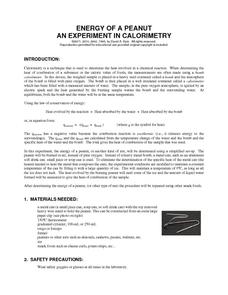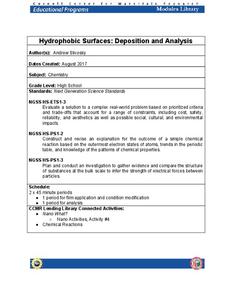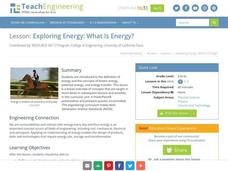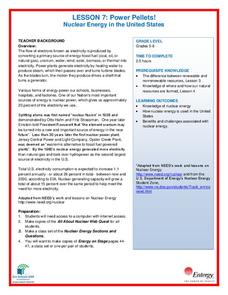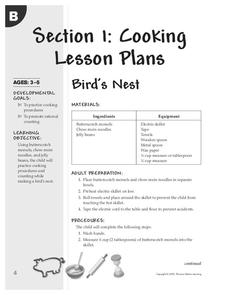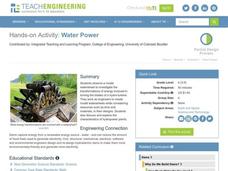Captain Planet Foundation
Solar Cooking Race
Study heat transfer with activities that focus on how heat energy works. Using a solar cooker, ice cubes, and heat transfer bracelets, kids experiment and record what they find by keeping ice cubes cold and vegetables hot.
Forest Foundation
The Sustainable Forest
As part of their examination of forest ecosystems, class members examine how foresters, biologists, botanists, geologists, and hydrologists work to together to develop a management plan for sustainable forests.
Chymist
Energy of a Peanut
Are you nuts? An engaging experiment burns nuts to find their kilocalories. Young chemists analyze at least two different types of nuts with their experimental results versus what is on the package. The resource offers a great lab...
Virginia Department of Education
Mystery Iron Ions
Young chemists perform an experiment to determine if a compound is iron (II) chloride or iron (III) chloride. Then they determine the formula, balance the equation, and answer analysis questions.
Chymist
Build a Spectroscope
Assist your emerging scientists with construction of their very own spectroscopes. Individuals construct a spectroscope to identify elements used in varying lights within a particular environment. They conclude the activity with a...
Virginia Department of Education
Properties of Compounds and Chemical Formulas
Young chemists have unknown compounds they need to sort. Performing three different tests on each, the chemical behaviors they observe become the basis for data analysis.
University of Texas
Free-Body Diagram
Preparing for an AP test is about more than bubble sheets and memorization. The two activities in this resource require a direct application of skills learned throughout an AP Physics course.
Rochester Institute of Technology
Molecules and Fuel Cell Technology
A fuel cell is where the jailer keeps gas guzzlers. Scholars review chemical reactions, chemical bonds, and chemical structure in order to apply these concepts. Participants construct fuel cell kits, using electrolysis to run the car and...
Cornell University
Hydrophobic Surfaces—Deposition and Analysis
Couches, carpets, and even computer keyboards now advertise they are spill-resistant, but what does that mean? Scholars use physical and chemical methods to coat surfaces with thin films to test their hydrophobic properties. Then they...
Teach Engineering
Exploring Energy: What Is Energy?
...Then the water heater exploded like a bomb. Using a video of an exploding water heater, the resource presents the definitions of energy, potential energy, and kinetic energy to be used in later lessons of the unit.
California Academy of Science
Optimal and Sustainable: Renewable Energy Revamp
More than 100 cities around the world have shifted from fossil fuels to renewable energy sources. Scholars investigate a city wanting to make this switch, but needs help determining how to make the shift. Groups consider all options,...
Carnegie Mellon University
Consumer Preferences in Lighting
What is a watt? This tongue-twisting, mind-bending question and others are answered through this lesson on the different lighting options available. With the support of a PowerPoint, teach your physical science class about units of...
National Wildlife Federation
Power Pellets! Nuclear Energy in the United States
Nuclear power provides about 20 percent of the energy generated in the United States. The seventh activity in the series of 12 tackles nuclear power. After sharing what they know about nuclear energy, scholars complete a...
Rochester Institute of Technology
Artificial Eye
Scientists in California developed a bionic eye that allows blind people to see edges of objects in black and white and costs $145,000. In the activity, groups of scholars discuss bioengineering, focusing on the human eye. They then...
Curated OER
Residential Power System
Perform data analysis on energy consumption to apply algebraic expressions to the real world. Learners will write and solve equations that answer various questions from residential power use. They will collect data at home and calculate...
Cornell University
Making a Battery
Don't be shocked when your class has a blast making their own batteries! Science scholars examine a dry cell battery, then design and construct a wet cell battery. The activity guides them through the parts of a battery, the variables...
Curated OER
Sources of Energy
Fifth graders take a close look at how energy changes from one form to another within their surroundings. They also study the ten different sources of energy and determine which are renewable and which are non-renewable. This seven-page...
Curated OER
The Greenhouse Effect
Why does it get so hot inside of our cars in the summertime? The greenhouse effect! Lab groups experiment to see what happens to an ice cube enclosed in a jar and placed in sunlight as compared to an ice cube outside of the jar. They...
Curated OER
Salt Bridges
In this chemistry worksheet, learners examine the salt bridge in order to apply in the laboratory setting. The sheet includes in depth background information.
Thomson Delmar Learning
Cooking Lesson Plans
Get cooking with some preschool and kindergarten-based cooking lesson plans. As young cooks follow the directions on the recipes, they practice hand-eye coordination, measurement, counting, and nutritional eating.
Energy for Keeps
The Energy Times
Extra! Extra! Read all about past and present energy use in a classroom-made historical newspaper. Useful as a cross-curricular assignment between science, history, and language arts, the project is sure to get young journalists...
Chymist
Batteries
Young scientists study the construction of a battery through experimentation. They engage in five experiments which combine to create a thorough study of the history of batteries beginning with a model of the first battery.
Teach Engineering
Energy Efficiency
Using the resource is probably the most efficient way to learn about efficiency. The 18th installment of a 25-part Energy Systems and Solutions unit has pupils investigate energy efficiency through discussions and associated activities....
Teach Engineering
Water Power
Young hydrologists observe a waterwheel which helps them investigate the transformations of energy that occur when the blades of a hydro-turbine are turning. They work together in pairs and pretend to be engineers who are building a new...
Other popular searches
- Static Electricity
- Electricity and Magnetism
- Electricity Experiments
- Current Electricity
- Basic Electricity
- Science Static Electricity
- Science Electricity
- Basic Electricity Worksheets
- Electricity and Light Bulb
- Electricity Circuits
- Electricity Magnet
- Electricity Lesson Plans




